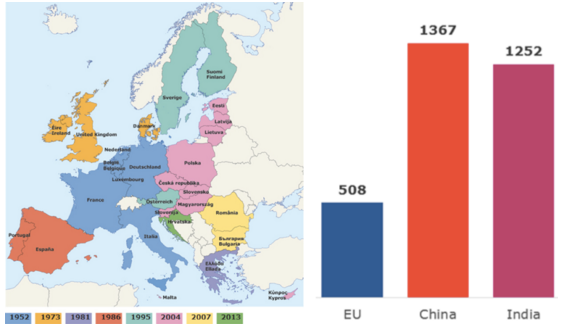Whoever argued that airlines are a bad investment clearly hadn’t seen the long-term performance of Ryanair. In 1998 the shares were trading as low as €0.5 but today are over €14. Ryanair plans to double the number of passengers carried by 2024 and has a new focus on improving customer service.
The creation of the European Union (EU) in 1958 has provided a significant opportunity for European companies. The 28 EU member countries have a combined population of 508m people versus 1.4bn in China and 1.25bn in India.
The 10 countries that were admitted to the EU in 2004 formed the largest single expansion in terms of population size. They were followed by Bulgaria and Romania in 2007 and then Croatia in 2013.
The free movement of people inside the European Union has seen significant relocations of the working age population. This has generally been towards nations with higher incomes per head and resilient labour market.
For holidaymakers the legal safeguards of the European Union have made it an attractive area to take vacations. This contrasts to trips outside of the EU to countries in North Africa or the Middle East.
EU growth and population in 2015: a large market

Source: European Union
Turning to the European airline industry and the 1990s saw a process of liberalisation as the EU pursued the goal of a single market. This means that national flag carriers are no longer able to receive regulatory or financial support.
In 1993 measures were adopted that gave greater access to intra-EU international routes. In 1997 liberalisation was extended to the domestic routes of members of the European Economic Area.
The Wizz Air IPO Prospectus (February 2015) states that: “This changed the nature of competition in European aviation and paved the way for the growth of low-cost carriers.”
Liberalisation has also been ongoing between the EU and third-party nations with a number of countries signing “open skies” agreements. These include Israel, the Balkan States, Georgia and Moldova.
The backdrop helps explain the long-term growth of budget airlines like Ryanair and easyJet. Both companies have benefited from EU expansion and the creation of a level playing field for competition.
Rising income per person also translates into increased airline travel as people take more holidays. Ryanair is 30 years old this year while easyJet is 20 years old and both companies…




